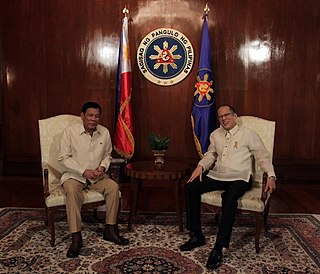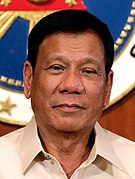
This article covers the history of the current Philippine republican state following the 1986 People Power Revolution, known as the Fifth Philippine Republic.

Rodrigo Roa Duterte, also known as Digong, Rody, and by the initials DU30 and PRRD, is a Filipino lawyer and politician who served as the 16th president of the Philippines from 2016 to 2022. He is the chairperson of Partido Demokratiko Pilipino, the ruling political party in the Philippines during his presidency. Duterte is the first president of the Philippines to be from Mindanao, and is the oldest person to assume office, beginning his term at age 71.

Alan Peter Schramm Cayetano is a Filipino lawyer and diplomat serving as a Senator since 2022 and previously from 2007 to 2017. He was the Senate Minority Leader from 2010 to 2013, and later Senate Majority Leader from 2013 to 2016. He also served as the Representative of Taguig–Pateros from 1998 to 2007 and from 2019 to 2022 and was the Speaker of the House of Representatives from 2019 until his resignation in 2020. He also served as the Secretary of Foreign Affairs from 2017 to 2018 in the cabinet of President Rodrigo Duterte, after unsuccessfully running for vice president in the 2016 elections as Duterte's running mate.

Prospero Rafael Castillo Nograles also called "Boy Nogie Nograles," was a Filipino politician who served as the speaker of the House of Representatives from 2008 to 2010. He was the first speaker from Mindanao in a hundred years of Philippine legislative history. From 1989 to 2010, he was elected to five non-consecutive terms as a member of the House of Representatives, representing Davao City's 1st district.

Paolo "Pulong" Zimmerman Duterte is a Filipino businessman and politician serving as the representative of Davao City's 1st district since 2019; he was a House Deputy Speaker during the 18th Congress. He previously served as vice mayor of Davao City from 2013 until his resignation in December 2017.

The 2016 Philippine presidential and vice presidential elections were held on Monday, May 9, 2016, as part of the 2016 general election. This was the 16th direct presidential election in the Philippines since 1935 and the fifth sextennial presidential election since 1992.

Sara Zimmerman Duterte-Carpio, commonly known as Inday Sara, is a Filipino lawyer and politician who is the 15th and current vice president of the Philippines. She is the third female vice president, the third vice president to come from Mindanao, and the youngest vice president in Philippine history. A daughter of 16th president Rodrigo Duterte, she previously served as the mayor of Davao City from 2016 to 2022, and from 2010 to 2013. She was also Davao City's vice mayor from 2007 to 2010.

The 2016 presidential campaign of Rodrigo Duterte was announced on November 21, 2015. Rodrigo Duterte, who was then serving as Mayor of Davao City, had refused to run and turned down other presidential and vice-presidential aspirants' offers to be his running mate, including that of Jejomar Binay, Miriam Defensor-Santiago and Bongbong Marcos. He was eventually elected President of the Philippines. Duterte's positions was seen to have resonated with older, working class Filipinos, particularly his promise to eliminate the wide-scale drug menace of the country and his harsh stances on crime in Davao City, which he served for more than 22 years, and corruption. Duterte's campaign also emphasized an anti-establishment tone, accusing political elites based in Manila of not doing much to solve problems in a move that was described as populist.
2017 in the Philippines details events of note that happened in the Philippines in 2017.

The presidential transition of Rodrigo Duterte started when then-Davao City mayor Rodrigo Duterte won the Philippine presidential election on May 9, 2016. Duterte topped the official count by the Congress of the Philippines on May 27, 2016, with 16,601,997 votes, 6.6 million more than his closest rival. The joint bicameral Congress proclaimed Duterte as the President-elect and Leni Robredo as the Vice President-elect on May 30, 2016.

Rodrigo Duterte's six-year tenure as the 16th President of the Philippines began on June 30, 2016, succeeding Benigno Aquino III. He was the first president from Mindanao, the first president to have worked in all three branches of government, and the oldest to be elected. He won the election amid growing frustration with post-EDSA governance that favored elites over ordinary Filipinos. His tenure ended on June 30, 2022.

Christopher Lawrence "Bong" Tesoro Go is a Filipino politician serving as a senator since 2019. He previously served in the Cabinet of President Rodrigo Duterte as Special Assistant to the President and Head of the Presidential Management Staff from June 2016 to October 2018. Go has served as the personal aide and special assistant to Duterte since 1998, back when the latter was still mayor of Davao City.

Ronald Marapon dela Rosa, known by his nickname Bato, is a Filipino politician and retired police officer who is currently serving as a Senator since 2019. He served under the Duterte administration as the chief of the Philippine National Police (PNP) from July 1, 2016 to April 19, 2018, overseeing the government's anti-drug campaign. He also served as Director General of the Bureau of Corrections from April 30 to October 12, 2018.

The War on Drugs is the intensified anti-drug campaign that began during the administration of President Rodrigo Duterte, who served office from June 30, 2016, to June 30, 2022. The campaign reduced drug proliferation in the country, but has been marred by extrajudicial killings allegedly perpetrated by the police and unknown assailants. By 2022, the number of drug suspects killed since 2016 was officially tallied by the government as 6,252; human rights organizations and academics, however, estimate that 12,000 to 30,000 civilians have been killed in "anti-drug operations" carried out by the Philippine National Police and vigilantes.

Jose Callangan Calida is a Filipino lawyer. He previously served as Undersecretary of Justice and executive director of Dangerous Drugs Board under the Arroyo administration, as Solicitor General under the Duterte administration, and as Chairman of Commission on Audit (COA) under the Marcos administration.

A bombing at the Roxas Night Market occurred in Davao City, Philippines, on September 2, 2016, causing at least 14 deaths and 70 injuries. On September 13, 2016, one of those injured, a pregnant woman, died, bringing the death toll up to 15.

Protests against Former President Rodrigo Duterte escalated on November 18, 2016, following Duterte's support of the burial of the late president Ferdinand Marcos. These series of protests are mostly conducted by progressive groups and other opposing figures mainly due to the ongoing war on drugs, the declaration of martial law in Mindanao, and employment issues such as contractual terms being applied by companies and inflation which occurred due to the passage of the Tax Reform for Acceleration and Inclusion Law. Other causes of the protests include the government's response to the COVID-19 pandemic in the country, the passage of the Anti-Terrorism Act of 2020, and the shutdown and franchise denial of ABS-CBN.
2019 in the Philippines details events of note that have occurred in the Philippines in 2019.

A dispute within the PDP–Laban, the ruling party of the Philippines, began on March 12, 2021 when Senator Manny Pacquiao began to criticize President Rodrigo Duterte and the government regarding the dispute in the South China Sea, alleged corruption in the government agencies under the Duterte administration, the government handling of the COVID-19 pandemic and the endorsement of the candidates for the 2022 presidential election, leading to the creation of two factions.

























